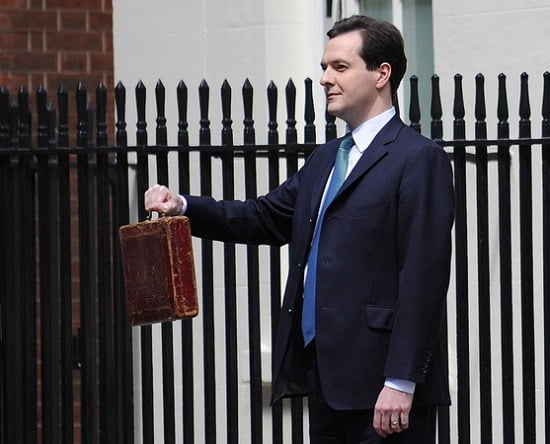by Dominic Hogg
8 minute read
George Osborne’s July Budget was widely seen as his first opportunity to fully reflect the perspective of the Conservative Party in fiscal policy. The trailers to his speech made it quite clear that the Chancellor would break with the coalition’s approach on environmental taxation. So did the July Budget represent a disastrous departure from green taxation?
To answer that question, we first need to remind ourselves of what the coalition’s approach was. The coalition agreement, which set out the previous government’s intentions, contained a pledge to ‘increase the proportion of tax revenue accounted for by environmental taxes’. In 2012 the Treasury adopted a definition of environmental taxes, against which the pledge was to be measured.
Define and fall
Economic Secretary to the Treasury Chloe Smith called the definition “an important step in meeting the government’s commitments on environmental tax, and our broader determination to be the greenest government ever”, although she emphasised that the aim was to deliver “a positive environmental impact without adding burdens onto business or households.” Perhaps to this end, the Treasury’s definition was limited to:
- Climate Change Levy
- Aggregates Levy
- Landfill Tax
- EU Emissions Trading System (EU ETS)
- Carbon Reduction Commitment Energy Efficiency Scheme
- Carbon Price Support
The Office of Budget Responsibility forecast that the proportion of revenue from these taxes would double by 2015-16, allowing the coalition to claim that (in its own terms) tax revenue from environmental taxes was indeed going up.
Some commentators found the definition unduly restrictive, and even the Treasury press release recognised that:
other taxes can deliver environmental benefits, but their aim is not environmental but revenue raising. These are specifically excluded from the Treasury definition and include taxes such as Vehicle Excise Duty, Fuel Duty and Air Passenger Duty.
The coalition approach therefore conveniently excluded major taxes that it subsequently reduced or allowed to be eroded by inflation. Fuel Duty is a striking example, where increases that had been announced by the previous Labour Government were postponed, and then cancelled by the Chancellor. The Institute for Fiscal Studies (IFS) helpfully summarised how this happened on p7 of its analysis of the 2013 Autumn Statement, and there has not been an increase since. In fact, the IFS separately observed that under more widely accepted definitions of ‘environmental tax’ (e.g. that used by the OECD), the coalition would probably have been falling short of its commitment.
C’est levy
It’s clear that the coalition did not set itself an unduly difficult pledge, but their record was not without positives. It was George Osborne who decided not to refund revenues from the CRC Energy Efficiency Scheme back to business, a move that was roundly criticised by industry. In opposition, the Conservatives had been keen to ensure that the EU Emissions Trading Scheme (ETS) would be more effective, and considered the case for a carbon price floor. This was duly introduced, and the Carbon Price Support (CPS) rates now generate significant revenue for the Treasury as part of the Climate Change Levy.
The Chancellor’s enthusiasm for these measures appears, however, to have waned: in the April 2014 Budget, considerable emphasis was placed upon making energy supplies secure and affordable for businesses, reflecting employers’ concerns regarding rising input prices. A ceiling was placed on the carbon price support (CPS) rates from 2016/17 to 2019/20 so as to limit the potential impact on competitiveness, and a further review of subsequent CPS rates is planned once reforms to the EU-ETS are finalised.

Thinking inside the box? Osborne may be under-utilising the potential of environmental taxes. Photo by Number 10 (CC BY-NC-ND 2.0), via Flickr.
In addition, the Government announced a number of measures to help “tackle the energy costs faced by the most energy intensive industries to ensure they are as competitive as possible”, including compensation for energy intensive industries (EIIs) for the costs of the CPF and ETS to 2019-20. The Budget report noted:
“…this package means that EIIs will be compensated for all government policy designed to support low carbon and renewable investment up until 2019-20, saving the average EII up to £19 million by 2018-19”.
A new CPF exemption was also introduced for fuel use in CHP plants used to supply electricity to manufacturing firms.
Back to bases
What, then, should we read into the latest Budget? Is it a radical break with the past? Now the Chancellor states:
The government will not extend the Coalition government’s commitment to increasing the proportion of revenue from environmental taxes to this Parliament, as such a target does not always reflect the success of government policy in achieving environmental outcomes.
At a theoretical level, we might agree with him, at least in one respect: the longer-term effect of successful environmental policies should be to erode the bases for environmental taxes. Emissions to the environment reduce, leaving less to tax, and causing revenues to fall.
The bulk of revenues from environmental taxes (understood in a broad sense, rather than under the Treasury definition) come from taxation of energy (including transport fuels) and of vehicles. Over time, these have become increasingly ‘carbon-focused’. If we decarbonise energy generation and transport, then in order for environmental tax revenues not to decline, the tax base will need to shift away from carbon, and towards (for example) the use of energy, or the use of roads, or the emission of non-GHG air pollutants.
There is some recognition of this in the Chancellor’s overhaul of vehicle excise duty, one of the taxes excluded from the Treasury definition of ‘environmental tax’. Declining revenue from the duty, related to the shift in the vehicle stock to lower carbon options, has triggered a restructuring that applies a minimum level of duty for all vehicles other than zero carbon ones.
A tax of opportunity
The theoretical merit of Osborne’s argument is weakened by one simple fact: the possibilities for using environmental taxes are very far from having been exhausted. For example, premature deaths from air pollution in the UK are estimated to be just shy of 60,000 per annum from particulate matter and from emissions of nitrogen oxides (both arising from (not just fossil) fuel combustion). Yet we have no mechanism that generates an effective economic incentive for any polluter to reduce emissions of these pollutants, at the margin; indeed, few EU countries implement taxes at levels remotely approaching the known damage costs associated with these pollutants.
A more interesting restructuring of VED would have included an element related to the emissions performance of vehicles. Carbon-based VED tends to favour diesel vehicles, which achieve relatively higher fuel efficiency than petrol engines, but worse emissions performance. Taxing emissions might alter the trend towards purchase of diesel vehicles, or incentivise improvements to emissions performance.
Likewise, there is no tax on the combustion of domestic heating fuels. The instinctive reaction to such a measure is that its impact would be too regressive – though the latest Budget suggests regressivity is not the concern uppermost in the Government’s mind. When the coalition was embroiled in a cold-snap-inspired spat about people having to choose whether to ‘heat or eat’, little attention was paid to the fact that the measures which were supposedly deemed responsible for impoverishing people through raising energy prices had cost implications of a couple of billion pounds, whilst the welfare budget was of the order £300 billion – although £13 billion smaller after the latest Budget.
Taxing domestic heating fuels would encourage their efficient use. Compensating measures for low-income households could be designed at a cost well below the level of revenues raised, ensuring that the question of whether a household could eat or not was not (if it ever was) linked mainly to the price of heat.
Whilst there is a rationale to rescinding the commitment to increase the proportion of revenues coming from environmental taxes, it really comes into play only if those taxes had previously been widely deployed, at rates which could be expected drive the changes we need. At that point, we would have to address the question of what should form the future tax base. After all, state revenues will have to come from somewhere. Fortunately, revenues from many levies are expected to rise in coming years.
Osborne’s announcement isn’t therefore a disaster – in part because of the odd way in which ‘environmental tax’ has been defined. That said, as things currently stand, there is much to be said in favour of sticking to spirit of the coalition’s commitment and shifting more of the overall burden of taxation onto things we’d like to see less of, such as pollution – especially if this means we can reduce tax on things we’d prefer to see more of, such as income, employment, or profits.
If the tax system is to be made more pro-growth, and if the economy is to become more efficient, then environmental taxes seem to be the least good candidates for tax cuts.






Leave A Comment